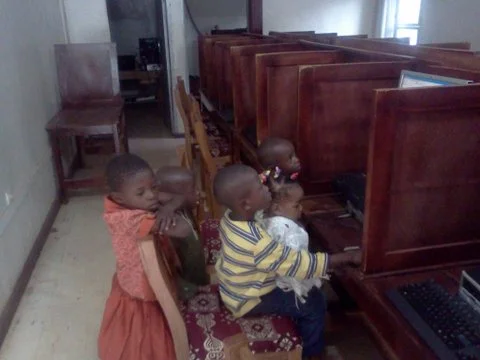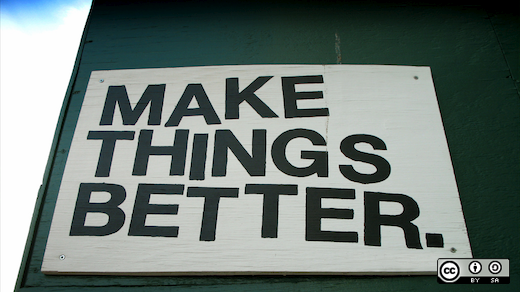Open source makes a lot of sense in rural areas and in third world countries. Lightweight and open source systems that are easy to use, and which allow normal users to become power users and contribute back to the open source community, can be ideal for countries like Cameroon, located in middle Africa.
Marc Stephan Nkouly, the manager of a successful Cameroon cyber cafe, is growing his business into a hub for education, entertainment, and entrepreneurialism, with the help of the up-and-coming open source operating system Peppermint. Open source technologies help to level the playing field and build a worldwide community of contributors to and users of tools that are providing new educational opportunities, resources, and jobs.
Shane Remington and Kendall Weaver run Peppermint, which was designed to be lightweight, easy to use, and integrated directly with cloud-based applications. Their offices are in the small town of Hendersonville in the rural mountain of North Carolina near Asheville. The impact of their project spans the globe, with a thriving community of contributors and an ignited interest from locations like Cameroon.

Nkouly describes his dream to buy the Cyber Cafe and to build a center that is community focused and open. "I will do my best to create a center where we can train young people in Linux and web development, because those are the kinds of skills and jobs that can make these youth have decent employment locally and can also contribute to improve local business."
Below, we ask Remington and Weaver about the impact of their operating system on businesses like Nkouly's, and about the future of Peppermint.

What is Peppermint?
Kendall Weaver: Peppermint is an open source project started a few years ago with the aim of offering a lightweight, web focused operating system that emphasizes speed and ease of use. Built using the common Ubuntu code base, Peppermint was put together using a lot of the sensibilities of more user friendly distributions such as Linux Mint while retaining the low resource use typical of lighter distributions. Peppermint is currently on its fourth major version, with a fifth due out in late spring or early summer 2014.
Shane Remington: Since our very first offering, Peppermint One, we've been averaging about 8 million downloads each version and we estimate that we have a community comprised of over 3 million users in 140 countries and territories worldwide. Peppermint installation CDs have ridden the front covers of Linux Format, Linux User, and PC Magazine, and we're consistently covered in the top tech news outlets year after year. From the beginning we've been aiming toward the best implementation of cloud to desktop experience and the critics agree that we are the top option.
How do you support users on the other side of the globe?
Remington: One of the key areas that we wanted to address with Peppermint, as a cornerstone, was that we had to be the absolute best Linux distribution when it came to inclusion. Everything we would do--community, social, support--would have to have a much different tone than the Linux that I grew up learning. And I mean having to prove your worth in the forums, even to ask simple questions, and being made to feel inadequate frequently. Kendall and I both agreed that those elements needed to be buried forever and I feel we've done a great job of that. Nowadays, the distance to the other side of the globe doesn't exist anymore with the Internet that's always on no matter where you are. We also had to attract the properly tempered support administrators and moderators who saw our vision clearly and would vow to maintain the positive and open vibe to the entire world. I can't say enough about how lucky we are for these guys who have been with us from the beginning. Its amazing what these guys can do.
How did you get started working with Nkouly in Cameroon, Africa?
Remington: In May 2013 I started seeing a slew of questions from Nkouly on Peppermint's Facebook wall. So I reached out to him personally to see what I could assist him with. Come to find out he works for an Internet cafe in Cameroon and he's eager to teach children Linux and open source software. His main concerns were that the people in his community would shy away from using Linux because they had never seen it and had no experience. So, in a matter of minutes, with a couple of Facebook messages, I explained our vision and goals for Peppermint. That this OS was designed for easy crossover from Windows and Mac, to prove that Linux could be super user friendly if designed properly, even for those who had never seen a Linux OS before.

After answering some common questions he jumped right in and installed Peppermint Three on a pair of machines and let some of his regular cafe users test them out. After a while, when the cafe was crowded, they would start complaining that the Peppermint machines weren't available. They would complain that the Windows machines were too slow and unresponsive. So he was able to use this as proof to the Internet cafe owner that moving to a Linux distribution, Peppermint specifically, would benefit him financially in the long run and the customers actually preferred using those machines over Windows.
The initial benefits he spoke about right away was that little to no training was needed in order to get users up and going with Peppermint. And, the other main concern he had from the very beginning was the availability of bandwidth for their location. He was really skeptical about the performance of the machines as sometimes Windows would seize up or freeze the browser completely. But, Peppermint proved to be the answer in that department as well.
Nkouly: At the beginning of the process, I simply believed it was too early to really measure anything. Now, I am very satisfied because most people using Peppermint in the cyber [cafe] had never touched anything Linux, and they are managing it very well. They are appreciating what it offers, and for others, they are correcting the misconception they had in the past, thinking that Linux desktop is difficult. I think that having this option is showing them that there are good alternatives to what is mainstream. We now have people of all ages interested in learning more about Linux and open source software.
What about Microsoft in Africa?
Weaver: Microsoft has the potential to work well in Africa, however relative inflexibility regarding licensing limits in areas with no or unstable currencies or areas with severely limited economic resources is an issue. As such, open source licenses give a unique opportunity as users simply have to obtain hardware rather than worry about proprietary licensing or running hacked or otherwise illegal versions of Windows. With Microsoft dropping support for Windows XP, a lot of the hardware that's available in Africa is now only suited for running lightweight Linux distributions as they won't handle the newer versions of Windows.
How can lightweight linux distributions help third world countries?
Weaver: Given the open licensing and free use, lightweight Linux distributions are a natural fit for any circumstance involving limited economic means or restricted hardware availability. The latter meaning access to only slower, older hardware.
There are billions of people in 3rd world countries. Are you specifically going after these customers?
Remington: Absolutely. We are open to all and in order to do that we need more team members from these countries to assist us in maintaining software and versions specifically for their needs. Right now, word of mouth gets us into these countries and hopefully one day, with the proper backing, we can do a much more effective job of becoming a presence there.
What is the potential for Peppermint to help 3rd world countries?
Remington: In one major way, not just for third world countries only, is keeping older machines out of the landfill and put back in service. Peppermint is very light, stable, and a great starting point for those who want to get started with Linux and not feel freaked out. The other major way is affordability as Peppermint will always have a free, community supported version, to explore with, learn and build upon.
Has being from a small town affected your attitude towards Peppermint? (for example made you think about light-weight, cheap solutions)
Remington: I'm sure it has. I've lived in the Appalachian mountains for the majority of my life, from Maine to the Berkshires in Massachusetts, and now in Western North Carolina. You grow up and are raised around others who are extremely resourceful and resilient. People need tools that work. Plain and simple. We provide that with Peppermint: It just works and doesn't stop. Buying a $3000 laptop proves nothing, other than you had the cash laying around to buy it. Operating a full scale business with spare parts and a homegrown operating system? That speaks volumes to me.
What is it like running Peppermint from Hendersonville?
Remington: I find it very freeing. I live in Western NC by choice and it's where I feel the most comfortable. Isn't that we all want? To live and work where we can be relaxed, creative, free of stress? Technology has drastically shortened the gaps between us all on Earth. Becoming your own remote and untethered business gets easier and easier these days. I say take advantage of that if you are driven and can manage your own time wisely.
Weaver: I particularly like that I can go just about anywhere I need to without having to rely on a motor vehicle. Our office is just a few blocks away from my apartment and the walk is just long enough for me to clear my head and prepare for what I have planned for the day. It's also nice that we're downtown and located close to lots of excellent food and refreshments. We go for Thai food a lot.
What does Peppermint do really well?
Weaver: Peppermint's strongest point is simply being a fast and sleek desktop operating system that stays out of your way. It works fine as is, with the included web applications, or works extremely well as a base to customize a system to whatever end with whatever software.
Another strong point is that we make it easier for users to create a modern looking desktop experience than many other lightweight Linux distributions, as our default configuration includes things like compositing.
Remington: I'd say that it's a combination of things. The top being able to blur the lines between desktop and cloud. You don't have to sacrifice your local applications like you will on a Chromebook. And, Peppermint is extremely fast, sleek, and the most stable OS of any kind I've ever run.
Who is on the Peppermint team? Where are they located?
Weaver: Shane and I are located in Hendersonville, North Carolina along with our front end web developer, Kevin Stipe. I handle the building of the operating system, general blueprinting of projects, and other things that involve code. Shane handles marketing, finances, community interaction, and basically everything else. In addition, I don't think we could survive without our fearless support leader, Mark Greaves, a Cornwall, UK resident, who handles a significant portion of our community support needs. We have two developers in Europe: Brian Tomlinson in Norway and Ikey Doherty in the UK, who contribute in various ways. We also have an art director and some other guys who help with our forum and community management.
What compelled you to start Peppermint?
Weaver: There are a number of reasons, some serious and some laughable, but ultimately all good in my opinion. We came up with the idea on a cold January night while we were out at the local pub we frequent. Somehow the conversation turned to desktop Linux and we both started going off about how we didn't really care for any of the currently available offerings. At the time, there was very little in the way of web focused distributions and we didn't much care for the ones that did exist; they tried a little too hard to shift away from the existing desktop paradigm. After some discussion, we eventually came to the conclusion that what we wanted was something like Linux Mint, but sleeker, sexier, faster, spicier, if you will. That led us to the name "Peppermint" and gave us some preliminary direction. I initially experimented with a number of ideas and pushed them past Shane who offered some additional direction. Eventually I came up with the idea of integrating web applications and local applications together in the menu. The idea worked well and Shane loved it. A couple of months later we had a private beta and shortly after that we had our first public release.
What is on the horizon for Peppermint? Is there a cloud solution coming out?
Weaver: We're presently working on a few things regarding the default desktop session in Peppermint. It's reasonably well known that the LXDE project, the default desktop environment in Peppermint as well as a number of other distributions, is changing direction in a rather significant way. We don't feel particularly inclined to follow in that direction so we're in the process of writing some new components for the desktop that should allow us to make a clean break from LXDE in the near future. Being that we're writing these from scratch, it gives us the opportunity to fix a few of the things we didn't particularly care for in LXDE originally and will give us the ability to add in some functionality that we think should be present, such as simple remote session management.
Remington: You will most certainly see Peppermint in the cloud in the near future as well as other unique services that are in development. 2014 is the year we put the pedal to the metal. Expect to hear a lot more from us this year and we'll lead it all off with Peppermint Five this Summer.






5 Comments